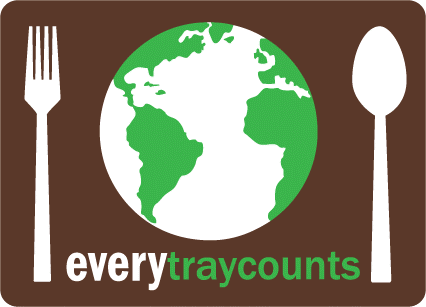Composting is a natural biological process that breaks down organic matter through exposure to oxygen. The resulting compost is high in nutrients and helpful bacteria that benefit the soil and make up a key component in organic farming. It benefits our local environment and turns organic material that would have been “trash” out of landfills.
Every Tray Counts advocates for the use of compostable school lunch trays where re-usable trays are not cost-effective nor possible without major building renovation. For a company to market its products as “compostable”, the products have to meet a composting standard, such as ASTM D6400 or EN 13432. Usually, the product will display a certification logo such as the Biodegradable Products Institute (BPI), Vinçotte, or BNQ logo to name a few (source: http://www.sustainablebiomaterials.org/lifecycle.endoflife.php).
These standards mean the trays will compost in a short amount of time (30 to 90 days depending on the certification standard) in a high-heat commercial compost facility and can be used as mulch in your garden! One source of confusion for consumers is that they mistakenly believe compostable products will decompose quickly in a landfill. This is not the case; landfills are designed to be dry.
Having a seal or written terms on purchased items such as “biodegradable,” “compostable,” “all natural,” or “environmentally friendly” and other vague descriptions are meaningless unless you have third-party standards or certifications. “Biodegradable” does not mean that trays are compostable, but it does mean that the trays will eventually biodegrade due to the actions of naturally occurring microorganisms. “Compostable” means that a product will undergo complete degradation by biological processes during composting into carbon dioxide, water, inorganic compounds at a rate consistent with other known compostable materials. The definition of compostable includes a specific time frame for biodegradation and that end results of the process will help the soil.
Every Tray Counts wants to see composting of lunch trays and food scraps in North Carolina schools. The map below from the North Carolina Department of Environment and Natural Resources specifically identifies composters accepting food waste. Take a simple step in your community. See what your school district uses for trays and ASK them to consider switching to a more sustainable compostable alternative! If there is no high-heat composter in your community; ASK your local government to begin composting or to initiate a composting program with a commercial composter. Then take action if needed!

To get more background on what composting does, check out the resources over at the US Composting Council or the EPA’s composting website.
Use this locator map to find other composters in the USA. Also, check out composting education resources from NCSU extension specialist.
North Carolina’s Department of Environment and Natural Resources (DENR) has their own collection of resources about composting in the state while Orange County has published a guide to using durable and compostable serving-ware: Servingware Guide.
